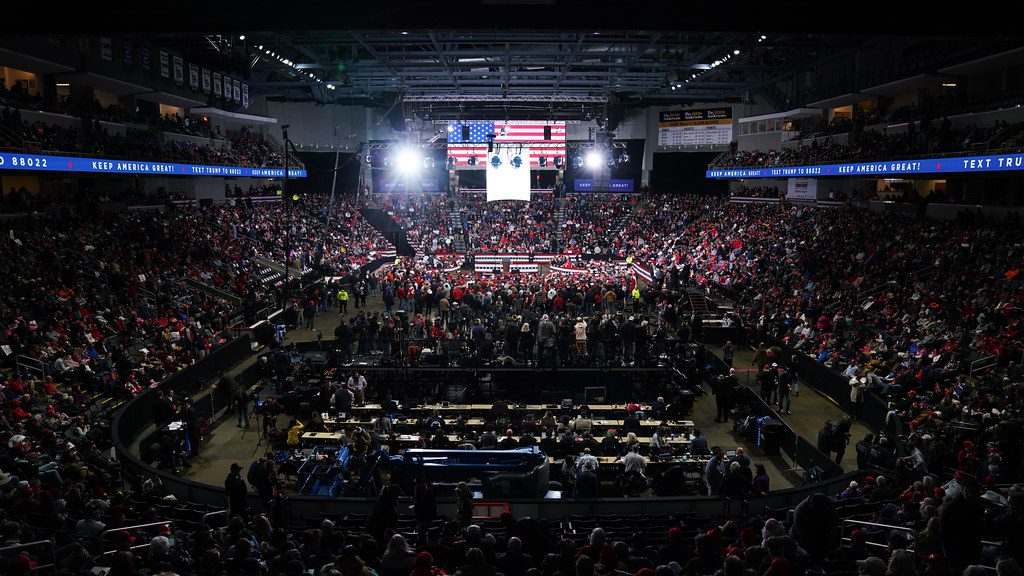What do pro-wrestling and politics have in common? More than you might think says Dr David Moon, researcher in our Department of Politics, Languages & International Studies who has just been announced as a shortlisted finalist for the Political Studies Review ‘Best Paper of 2022’ award.
Dai’s paper ‘Kayfabe, Smartdom and Marking Out: Can Pro-Wrestling Help Us Understand Donald Trump?’ was first published in 3 November 2020 - election day in the States. It explores the former President’s long links with World Wrestling Entertainment and the impact this had in getting him elected.
We asked Dai some questions about the paper and his shortlisting.
Why did you decide to write this article?
I decided to write this paper in part to ‘scratch an itch’. As I’ve discussed at greater length elsewhere, the idea that analogies exist between the performative aspect of professional wrestling and politics is something I’ve toyed with mentally for years. With the entrance of Donald Trump into the 2016 US Presidential campaign and his subsequent election, a justification emerged to interrogate that idea more rigorously. Here was an individual with a long and extensive history with pro-wrestling, a member of the World Wrestling Entertainment (WWE) Hall of Fame, whose campaign style was widely linked to his pedigree as a pro-wrestling performer.
Most of the media pieces commenting on Trump’s relationship with pro-wrestling were pretty perfunctory, so as an academic I decided to undertake a bit of interdisciplinary research by turning to scholars with expertise in the study of pro-wrestling (a surprisingly large, active, and vibrant research field) to discover how their work might help fellow scholars in my field of political studies struggling to explain the Trump phenomenon with existing tools/approaches.
Another element that led to the decision, however, was that I just thought there was a fun, entertaining piece of work here! Far too often academia can be relentlessly stone-faced, sober, and sensible in tone. I wanted to try and write a more playful piece without abandoning academic rigour to do so; with this article there was the potential to produce something intellectually valuable that people would also enjoy reading, and that I would enjoy writing.
The major focus of my research agenda for the last decade has been the politics of devolution and the Welsh Labour Party. It remains a primary research subject; nevertheless, the chance to step outside and engage with an entirely new literature and totally different topic was intellectually reinvigorating – and indeed having that distance, ‘scratching the itch’, helped me regain my enthusiasm for the subject since I’ve returned to it.
I know it’s been really widely read, have you been surprised how far it’s travelled?
When I took the unorthodox decision to try and bring pro-wrestling into political studies, I was aware there was a risk I could genuinely harm to my career. Pro-wrestling is widely seen as a vulgar, stupid, childish entertainment form – not entirely without justification – so any attempt to work with it and treat it with intellectual respect was bound to leave some scholars scandalised or sickened (especially considering the self-important image many academics adopt).
So, when I started my primary concerns were whether I could get the piece published, if peer-review would see it stomped to pieces, or editors laugh at it. Even if it was published, I worried it might end up appearing an embarrassing oddity on my publications list, which would raise eyebrows amongst peers who thought I was losing the plot. The fact that it found itself a home in a leading political studies journal, has enjoyed a wide and enthusiastic readership, and now has a Best Article of the Year nomination is therefore incredible. It is also validation of the decision to take the risk as a researcher to try something outside of not only my comfort zone, but the wider fields.
I’ve seen you’ve given various talks on this, what are some of the stand-out ones?
In an example of fortuitous timing, in 2022 the WWE brought its first Stadium-sized show to the UK in 30 years, hosting ‘Clash at the Castle’ at the Principality Stadium in Cardiff. This show was financially supported by the Welsh Government as part of its Major Events strategy, with clear conditions attached by Government Ministers that the WWE promote Brand Cymru through its multi-media platforms. And here I was, the only academic in the world with a publication track record showing expertise in both Welsh politics and pro-wrestling.
The cross-over was too good to be true, and led to invitations to talk to the Welsh politics podcast Hiraeth as well as the Pro-Wrestling Torch podcast The Deep…Dive, giving me the opportunity to try explaining to an audience interested in Welsh politics why they should care about pro-wrestling, and to an audience of pro-wrestling fans why they should be interested in Welsh politics. Both were uniquely enjoyable experiences and coming out of it I’ll now be presenting a paper on this topic at this year’s annual conference of the Political Studies Association.
Any surprising impacts or approaches off the back of this article?
One thing I will say is that it turns out a surprising amount of seemingly sensible, apparently respectable people are really excited to have the opportunity and excuse to talk about pro-wrestling and revisit a lapsed teenage fandom. That initial itch I wanted to scratch is something it turns out lots of people have felt to some extent, and I’m glad the article is a jumping off spot for people to do so.

